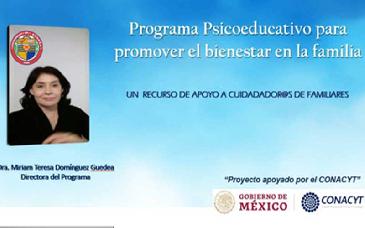

Comment posted: 2021-01-11
Hermosillo, Sonora, January 11, 2020 .– The University of Sonora has the psychoeducational program available to the entire community to promote well-being in the family. A resource to support caregivers – the elderly and children – led by Miriam Teresa Domínguez Guedea, professor in the Department of Psychology and Communication Sciences.
This program can be taken for free by those interested in the topic and especially those caring for their older relatives, children and / or adolescents.
“This action consists of a series of animated videos on a YouTube channel that provides psychological guidance in managing the well-being of those who care about other people,” he said.
He indicated that under the content there will be found bases to understand the crisis in the human experience, foundations and strategies to enhance well-being and psychological resources, improve communication aimed at the appreciative understanding of emotional needs, as well as solution skills in dealing with difficulties. .
Likewise, he pointed out that the invitation to all people to visit the YouTube channel Cuidamos Familiares (www.youtube.com/channel/UCF6VmhiWSf9GXfFbuE2AhhA) has expanded, as well as to take advantage of this community-wide resource. The presentation video of the program can be found at: www.youtube.com/watch?v=IXwVM_1-V78.
The Postgraduate in Health Sciences academic emphasized that the project was supported by the National Council of Science and Technology (Conacyt), in its call for projects for universal access to knowledge in the face of the Covid-19 emergency.
Importance of the program
Domínguez Guedea noted that the number of older adults in need of daily care worldwide is increasing, and that this process is proceeding in a worrying manner in Latin American countries, given the social and health challenges affecting a significant part of the population.
To this circumstance, he added, is added the current health crisis due to covid-19, with people over 60 being among the most vulnerable groups in terms of morbidity and mortality.
“Everyday care often generates important economic, physical and emotional demands, usually absorbed by one or a few members of the family, usually middle-aged women, with extra hours of work for work, household needs and care. more family members; for example minors ”, the academic specified.
He argued that socio-cultural premises still predominate in Latino contexts that normalize this task overload as a responsibility that belongs only to those who care, and that consequently social and institutional support mechanisms are scarce.
“So it is not surprising that health care providers feel stressed by the amount and diversity of demands they face on a daily basis,” he said. For this reason, the psychoeducational program provides a support tool that enhances the capabilities of caregivers to address the challenges of day-to-day care, especially in these times of pandemic.
Project employees:
Miriam Teresa Domínguez referred to having in the project the valuable collaboration of academics and students from the Department of Psychology and Communication Sciences and the Postgraduate Program in Health Sciences of the University of Sonora, researchers from El Colegio de Sonora, professionals from the Directorate -General Health Promotion and Disease Prevention of the State Secretariat of Health, as well as psychotherapists of civil society organizations (Jiapsi-Centro de Desarrollo Personal, Familiar y de Pareja, AC; Red Sonora de Apoyo Psychosocial in Crisis, AC and Dorita de Ojeda Therapy and Rehabilitation Center).
They have also shared their experience and knowledge for the integration of program content, caregivers, children, adolescents and older adults from different parts of the republic.
Likewise, he highlighted the work of the academic Marcela Martínez Preciado and the student Ana Abygail Guzmán Ríos, of the Digital Content Production Laboratory of the Bachelor of Communication Sciences, who produced the videos that are part of the psycho-educational series.